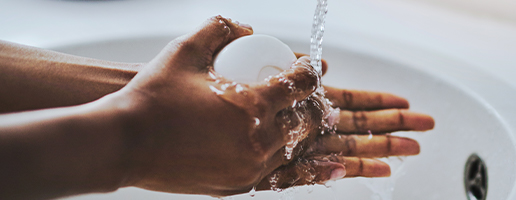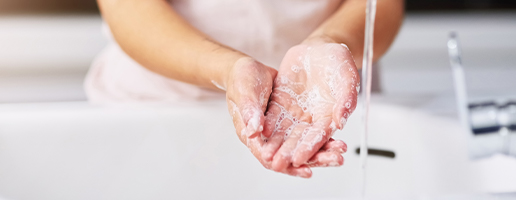What you need to know when talking to your kids about COVID-19

With the world currently trying to keep up to speed with all the latest developments relating to coronavirus 2019, children are in a vulnerable position when it comes to understanding what it’s all about and how it actually affects their lives. As a parent, do you really know how to address the current health concerns with your children?
It’s a sensitive time for all of us. Any global health concern leaves people feeling unnerved or even anxious. Children react to the emotions of those around them, especially their parents.
Still, with the rapid spread of COVID-19, it’s vital for children to understand the importance of precautionary and preventive measures. Many children need guidance from the adults around them.
Keep up to date with the latest information
It’s important for adults to behave responsibly and ensure that they keep up to date with all of the latest information.
“Yes, the world may be experiencing a major health crisis. Parents want to protect their children as well as possible but knowing the correct information can better inform this process,” says Discovery Health’s Head of the Centre for Clinical Excellence, Dr Noluthando Nematswerani.
There is an incredible amount of information available at the moment. Not everything being written or shared is accurate or suitable for children. Parents should use official healthcare sources in order to learn about COVID-19 themselves. By learning the facts, the fears or anxieties they may have themselves can easily subside.
As much as there is misinformation, misconceptions and myths floating about, there is a growing base of credible, accurate information for families to access freely and educate themselves.
“Make sure, as a parent, that you clearly understand the specific signs and symptoms of COVID-19 versus the common cold or influenza infections,” says Dr Nematswerani. “Along with being able to recognise the signs, understand what is currently known about COVID-19’s transmission patterns. This is the best way to be able to clearly communicate preventive measures to your children,” she adds.
It’s safe to say that what parents themselves don’t clearly understand, their children won’t understand either.
Now, turn your knowledge into action
International and local health authorities have highlighted the importance of preventive measures since the first cases of COVID-19 emerged. This was done in an effort to try and contain this virus.
Containment has challenging, which has led to government announcing new containment measures. Everyone should try to prevent to spread, and parents need to be highly alert when it comes to their own behaviour and that of their children.
“Parents must remember that the language that they use to explain COVID-19 to their children must be age appropriate and something children can understand. Sometimes visual demonstrations or examples to illustrate something, like proper hand washing and respiratory practices, makes for clearer understanding,” says Dr Nematswerani.
- Read more on how to teach your kids about protecting themselves against COVID-19 here
The stress factor
Some children will need regular reassurance. The current circumstances are unusual. Children will respond to the stresses and anxieties of others, and may also be stressed and anxious themselves. They may not understand everything that is going on but they can pick up on the general atmosphere around them in their own homes and from what they see on television and social media.
An anxious child may show they’re anxious in many ways, and even have physical symptoms. Parents should look out for these signals and attend to their children with understanding and compassion.
“Some children may respond to anxiety by experiencing aches and pains such as headaches or stomach cramps. Others may show signs of clinginess, anger or even withdraw,” says Dr Nematswerani.
“It’s helpful to be supportive and reassure them that it is okay. Parents can explain to their children that many others are feeling much the same. After all, the current health situation is not the norm. Being unnerved is a normal response. Uncertainty has this effect on all of us,” she explains further.
“Parents should be mindful and encourage their children to express their concerns or ask whatever questions they may have. Answer what you can. What you don’t know, reassure your child that you will find out and share it with them soon. When you do, ensure that those facts are spoken in a clear and simple way for them to understand.”
What you can do
Providing clear examples for children talking through real-life scenarios can help them to better recognise the behaviour that could place others at risk, and identify what they can do to best protect themselves.
Be realistic, but also reassuring. If your child falls ill and you know that the right thing to do is to self-isolate your child and notify your healthcare provider, do so. But also make sure your child understands that it’s not their fault.
Comfort a child as seems most fit and encourage them to realise that everyone around them is practicing the same preventive measures. Everyone is actively trying to keep themselves and others safe. This may be reassuring to a child feeling some level of distress.
“A panicked situation has this effect on any one of us,” says Dr Nematswerani. “Think of things from your child’s perspective and what’s most important to them. This will make it easier for you to explain things to your child. Don’t forget to be calm yourself – your child will likely respond in much the same way as you,” she concludes.
ALL MEDICAL INFORMATION FOUND ON THIS WEBSITE INCLUDING CONTENT, GRAPHICS AND IMAGES, IS FOR EDUCATIONAL AND INFORMATIONAL OBJECTIVES ONLY. DISCOVERY HEALTH PUBLISHES THIS CONTENT TO HELP TO PROTECT AND EMPOWER ALL SOUTH AFRICANS BY PROMOTING A BETTER UNDERSTANDING OF COVID-19.
Find a healthcare professional near you
Find a doctor or hospital near you online or by using the Discovery app.
Related articles

Outbreak of the 2019 novel coronavirus
The 2019 novel coronavirus (2019-nCoV) has caused an outbreak of fatal respiratory illness first detected in Wuhan, China. This is a completely new strain with no vaccines available. The best way to prevent infection is to avoid being exposed to this virus.

Understand the Novel Coronavirus (COVID-19) and prevent infection
No country is immune to the spread of the Novel Coronavirus - officially named COVID-19 by the World Health Organization (WHO). The outbreak has reached pandemic proportions and been declared a global public health emergency.

Novel Coronavirus - wash your hands of the threat
As toddlers, we learnt to wash our hands. But, did we ever master the skill to the extent that is needed to wash pathogens off our hands, and save lives? Multiple studies show people don't wash their hands at the right times, in the right way or for the right amount of time. We contaminate the things and people we touch with the germs we carry on our hands.